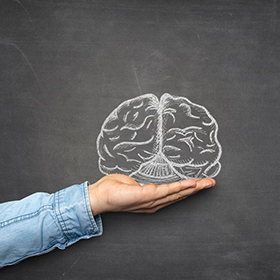- Health & Wellness
- Primary Care
- Service Line
- Women's Health
6 Ways to Improve Brain Health

Every day actions can make a difference in brain health, habits that can potentially lower the risk for cognitive decline. There are habits you can start practicing now to help stave off forgetfulness later and help maintain a healthy brain. It is never too late to take charge of your brain health.
#1: Paint, Draw or Solve Jigsaw Puzzles
Activities like painting and working jigsaw puzzles (with more than 500 pieces) stimulate the right side of your brain, requiring you to practice both visualization and thought. If you’re a left-brain thinker, for example, meaning you’re more logical, analytical and objective, practicing these activities engages the right side of your brain.
#2: Exercise
Exercise is everything. If you’re active four times a week, for 12 weeks in a row, you’ll have twice the blood flow to your hippocampus, where those neurons are created. The hippocampus is a region of the brain associated with memories, learning and emotions, and continues to create new cells as we age.
Additionally, working out helps feed and create new neural pathways, which transmit messages between nerves. The more times you choose to do, and then perform, a certain activity, your brain forms a neural pathway. So, when you regularly exercise, you can actually create a new neural pathway, or (exercising) habit.
#3: Eat Foods Your Brain Needs
Our brain needs fats, particularly, the “good” kinds – including omega-3 and omega-6 fatty acids – to operate. However, Pam says she tends to stress the importance of eating omega-3s because it’s easier to get these nutrients through your diet, instead of supplements. Foods high in omega-3 include:
- Fish, including tuna, salmon, cod, snapper and sardines
- Cauliflower
- Cabbage
- Kale
- Edamame
- Walnuts
- Flaxseed
- Tofu
Polyphenols, on the other hand, are important nutrients because they help clean the brain. Polyphenols, or antioxidants, include red wines, Concord Grape Juice and blueberries.
#4: Participate in Debates
Debating and arguing, however, are not the same thing, Pam points out. When you debate, you’re thinking fast. Debates force your brain to listen to the individual you’re debating with and think – quickly – to articulate your response.
#5: Laugh Often
Cortisol, the stress hormone, kills brain cells. When you laugh and release endorphins, however, you’re feeding the brain, so stress-relief activities, like laughter, are important for improving your brain health. When we’re done laughing we feel good because we just ate all the bad cortisol.
#6: Exercise Your Peripheral Vision
Acetylcholine, a neurotransmitter, is a chemical messenger allowing neurons to communicate with each other. It’s critical for memory, mental alertness, concentration, and other cognitive functions. Studies show that when you're low in acetylcholine, you can’t remember and become forgetful. (Acetylcholine deficiency is also associated with Alzheimer’s disease.)
Through exercising your peripheral vision, you stimulate your hippocampus and, in turn, when you go to sleep, your body gets a new release of neurons and brain cells. Try the following activity to exercise peripheral vision:
- Sit in a place outside your house (on a bench or in a café).
- Stare straight ahead. (Do not move your eyes back and forth).
- Concentrate on everything you can see with your eyes while looking straight ahead – using only your peripheral vision.
- Write down everything you see (both straight ahead and peripherally).